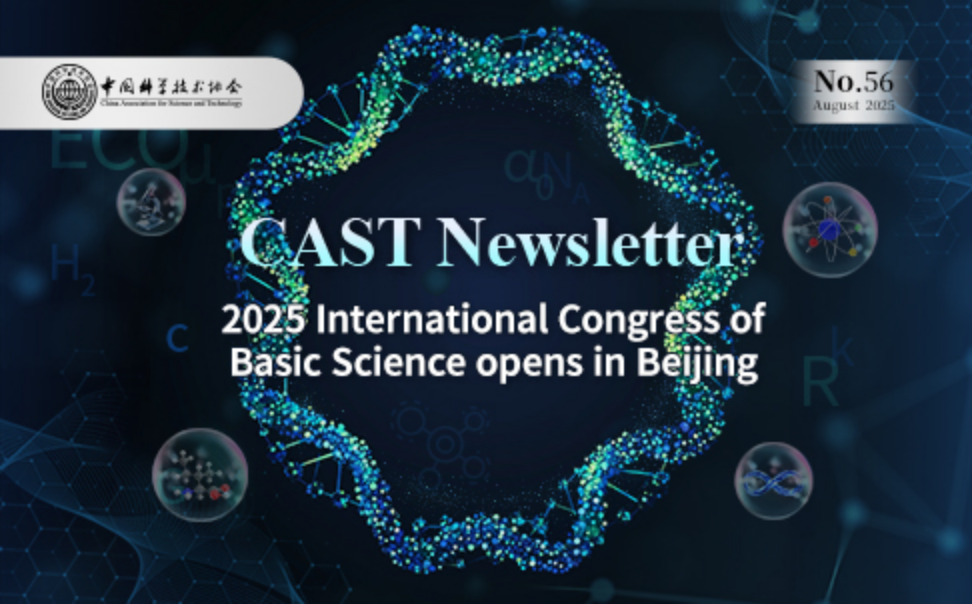CAST Newsletter No.56
2025 International Congress of Basic Science opens in Beijing

On July 13, the 2025 International Congress of Basic Science (ICBS 2025) opened at the China National Convention Center in Beijing. Themed “Advancing Science for Humanity,” the event was co-hosted by China’s Ministry of Science and Technology, the China Association for Science and Technology (CAST), and the International Consortium of Chinese Mathematicians (ICCM), and other organizations. The congress brought together an impressive roster of attendees, including winners of the Shaw Prize, the Wolf Prize, and the Dirac Medal; more than 80 academy members from around the world; over 10 presidents and representatives of mathematics societies; and nearly 1,000 experts, scholars, and young researchers from global universities, research institutions, and academic organizations.
At the opening ceremony, the 2025 Basic Science Lifetime Achievement Award was presented to scientists who have made groundbreaking and lasting contributions to mathematics, physics, and information science and engineering, and have played a pivotal role in shaping these fields.
This year’s honorees included six distinguished scholars: Samuel Chao Chung Ting, Nobel Laureate in Physics and professor at MIT; Steven Chu, Nobel Laureate in Physics and professor at Stanford University; David Jonathan Gross, Nobel Laureate in Physics; Robert Endre Tarjan, Turing Award winner; Shigefumi Mori, Fields Medalist; and George Lusztig, Wolf Prize recipient.
The ceremony also featured the presentation of the Frontiers of Science Award, which recognized 118 outstanding papers in three core areas: mathematics (75 papers), theoretical physics (16 papers), and theoretical computer and information sciences (27 papers). The recipients came from more than 20 countries and regions, representing a wide range of universities, research institutions, and companies. Awardees included Fields Medalists, Breakthrough Prize in Fundamental Physics winners, and rising talent.
Researchers from 13 Chinese institutions—among them Tsinghua University, The Chinese University of Hong Kong, Fudan University, and the Chinese Academy of Sciences—collectively received 17 awards. Their work spans mathematics, theoretical physics, computational mathematics, artificial intelligence and machine learning, and interdisciplinary applications. Global AI leaders OpenAI and Meta’s FAIR (Facebook Artificial Intelligence Research) were also recognized for their cutting-edge contributions.
On July 14, the ICBS 2025 Physics Night was held at the Beijing Institute of Mathematical Sciences and Applications. Nearly 700 scientists and top graduate students from institutions such as the Chinese Academy of Sciences, the University of Hong Kong, Stanford University, and the California Institute of Technology (Caltech), along with other ICBS participants, gathered for an evening of thought-provoking discussion and exchange.
During the keynote session, Steven Chu, Nobel Laureate in Physics, 2025 Basic Science Lifetime Achievement Award recipient, and professor at Stanford University, shared his reflections on how research institutions sustain long-term excellence. He emphasized that breakthroughs often emerge from fearless experimentation, and that genuine innovation demands curiosity, a willingness to take risks, and the courage to challenge established norms.
Hirosi Ooguri, professor at Caltech and a fellow of the American Academy of Arts and Sciences, addressed the ongoing challenges in string theory, which seeks to unify general relativity and quantum mechanics. He noted that progress in the field has been slow over the past 40 years due to its complexity—estimated to be more than 25 times greater than that of the Standard Model of particle physics. Comparing quantum gravity to the “final boss,” Ooguri underscored that basic science is a “value-rational action” aimed at understanding the truths of nature.
In the panel discussion that followed, experts explored the theme “The Importance of Fundamental Science.”
Samuel Chao Chung Ting, Nobel Laureate in Physics, Basic Science Lifetime Award recipient, and professor at MIT, highlighted that the driving force behind basic research is human curiosity and the desire to uncover the universe’s underlying principles. The discoveries in fundamental science are the engine behind technological progress and social improvement.
Wang Yifang, Director of the Institute of High Energy Physics (IHEP) at the Chinese Academy of Sciences and recipient of the Breakthrough Prize in Fundamental Physics, spoke about the challenges facing basic research today, including funding constraints and obstacles to collaboration. He called on the scientific community to enhance its ability to communicate, helping the public understand the logic of scientific inquiry.
Zhang Xiang, President and Vice-Chancellor of the University of Hong Kong and a member of the U.S. National Academy of Engineering, urged deeper academic exchange and collaboration in today’s complex international environment. He also encouraged scientists to embrace emerging technologies such as artificial intelligence to boost productivity.
For detailed information, please click here to download CAST Newsletter No. 56.
Tag: CAST Newsletter
